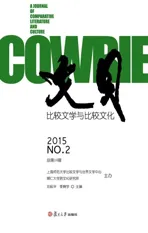主编前言
2015-11-14刘耘华
刘耘华
比较诗学是比较文学的一个重要部分。本辑组织的“东西诗学研究专题”,是上海师范大学比较文学与世界文学研究中心主持的国家重点学科项目—“比较诗学与比较文化丛书”之副产品。在丛书的编纂与讨论过程中,我们发现“诗学”一词的内涵其实是相当模糊的。一方面它在不同的民族历史文化发展中拥有各自独特的丰富内涵,另一方面却又在跨界的文化交往中频繁地互相指代,因而产生了较为严重的名实乖离。诗学术语的跨文化旅行,既开辟了民族诗学之传承流衍的新航道,同时也造成了彼此之间的混乱与纠纷。不过,倘若对混乱的现象予以正本清源的考辨和诠释,那它无疑就能成为比较诗学研究中一个充满挑战、但是魅力无穷的新领域。
我们邀请几位专家对西方(包括古希腊)、日本及印度的“诗学”概念进行基础性的源流梳理,所寄托的正是对诗学跨界旅行所开辟的文化新航道进行系统清淤的期盼。随着思想清淤的深入拓进,我们希望还能将“诗学”拉回到各自的文化语境之下,在与“哲学”“美学”“宗教”“伦理学”“历史学”以及“音乐”“绘画”“舞蹈”“建筑”等其他学科之相互缠夹与交叠的关系中,找出其在文化系统中的本真定位、构成要素、思维特质、文化功能乃至运行机理等,并进一步探寻“元诗学”的原理和法则。
本辑刊发的《“易之三名”》与《“空漠之眼”》是两位哲学博士的文论言说,前者着眼于符号意指的多元呈现,后者探讨的是一篇后人类主义名作的游牧方略,擘肌分理,阐发深透,都是比较诗学研究佳构。
为保证论文质量,我们实行严格的双向匿名审稿制,这样做,虽然于作者、于编者均添增了不少麻烦,但对于读者和社会却也贡献了一份责任心。在此,我们感谢作者的理解和支持。
本刊于2014年第2辑推出“中国比较文学研究年度报告(2013)”,并得到学界的关注;本辑再推出“中国比较文学研究年度报告(2014)”,期望学界继续关注,加以补充或提出商榷。
Notes from Editor-in-Chief
Yunhua Liu
This Issue’s featured topic, “Eastern and Western Poetics Studies,” is a byproduct of theComparative Poetics and Comparative Culture Series
, a national key discipline project of the Research Center for Comparative Literature and World Literature at Shanghai Normal University. As we see it, Comparative Poetics is an indispensable facet of Comparative Literature. But through the process of compiling and organizing the series, we came to realize that the connotation of “poetics” is quite vague. On the one hand, the meaning of “poetics” is necessarily unique and particular to the historical developments and cultural context of any given time and place. On the other hand, in cross-cultural studies the term is often employed in such broad and ill-defined ways that it becomes difficult, if not impossible, to seriously engage in scholarship on the topic. In this way, culturally variant notions of poetics enable us to explore the particularities of different national traditions and heritage,yet also create impenetrable divides between scholarships emerging from different contexts. We envision a new field of Comparative Poetics as a challenging yet indispensable way to engage with this tension.In this Issue, we’ve invited several experts to comment on the origin and development of the term “poetics” in different traditions: the Western world(including ancient Greek), Japan and India. With this line of inquiry, we anticipate being able to contextualize “poetics” within cultural milieus, allowing commentary on its identity, formal elements, conceptual characteristics, cultural functions and operational mechanisms, as we engage in discussions of the relationships between“poetics” and other subjects, such as philosophy, aesthetics, religion, ethics, history,music, painting, dancing, and architecture. Once established, we can then move on to seeking more broad principles of “meta-poetics”.
Also included in this issue are two theoretical interpretive essays, written by PhDs in philosophy: “The Name of Change” and “The Gazeless Eyes.” The former focuses on the multi-representation of symbols; the latter explores the nomadic strategies of a masterpiece of post-humanism. Both are wonderful examples of the creative potential in the field of Comparative poetics.
To ensure the quality of our articles,Cowrie
will continue to use a double-blind review process. While we understand the burden this can place on the reviewers,editors, and authors, we feel it is in the best interest of our readers to maintain the highest level of quality. We are grateful for the understanding and continued support of all of our contributors.Finally, we were pleased with the amount of attention our “Annual Report on the Study of Chinese Comparative Literature (2013),” released as Issue 12 (2014,No. 2) ofCowrie
, attracted within academia. This edition includes our Annual Report for 2014. We look forward to continuing previous discussions and piquing new interest with this Issue.(Translated by Yanyan Deng; edited by Julie Starr)
